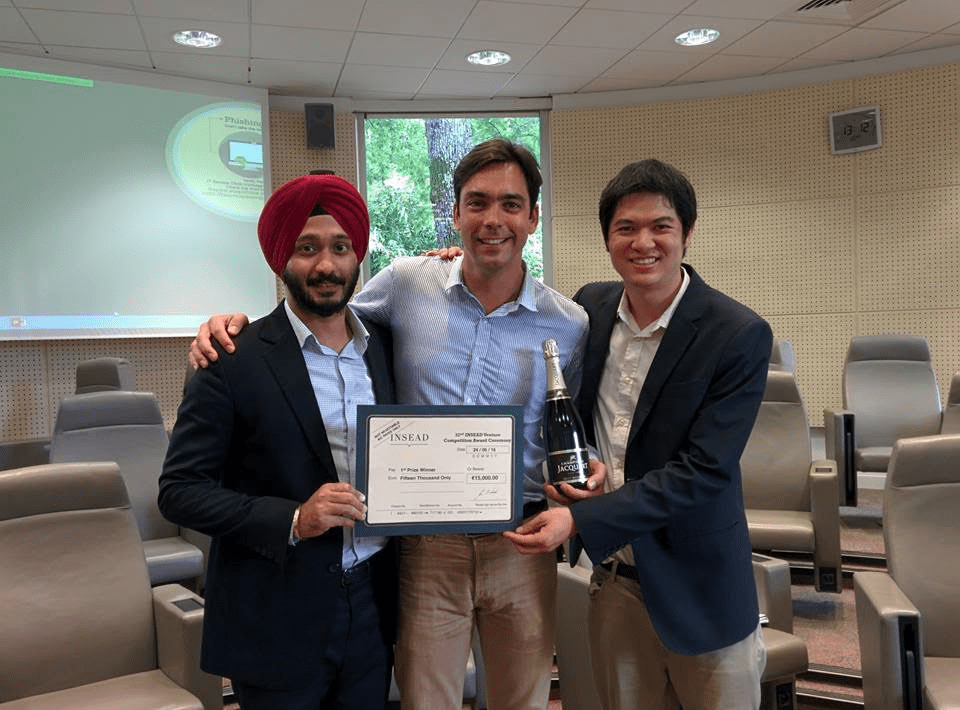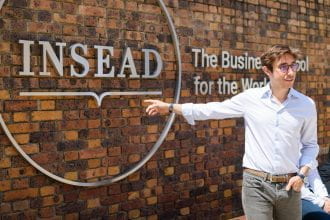Is success in business compatible with social good? Of course. In fact success is imperative, say the co-founders of StanPlus, an INSEAD startup that is improving lives in one of India’s biggest cities.
In India, the average time for an ambulance to arrive is 45 minutes — if it comes at all. As a result, 75 per cent of patients prefer to use their own car to go to a hospital. Shockingly, 30 per cent of patients die before they even get to the emergency room.
Changing these grim statistics is the goal of three young INSEAD graduates, Prabhdeep Singh MBA‘16J, Antoine Poirson MBA‘16J and Jose Leon MBA‘16J, who created StanPlus, a high-tech ambulance dispatch service in Hyderabad, India’s fourth largest city.
“The broken medical transportation system in India and the challenge to improve it is the fuel for us,” says StanPlus CEO Prabhdeep, a pharmacist by training and former Chief of Staff/Executive Assistant to the CEO of Glenmark Pharmaceuticals. Before coming to INSEAD, Prabhdeep led Glenmark’s sales team in Hyderabad.
 StanPlus’ journey on the road to success began in June 2016 when it won the INSEAD Venture Competition. Today, it has become the largest ambulance dispatch service in Hyderabad with 67 ambulances under contract.
StanPlus’ journey on the road to success began in June 2016 when it won the INSEAD Venture Competition. Today, it has become the largest ambulance dispatch service in Hyderabad with 67 ambulances under contract.
This means it can respond to a transportation request within 15 minutes, 30 minutes faster than average, for almost half of Hyderabad’s population. It plans to have 200 ambulances under contract by April 2017 which will allow it to cover all of Hyderabad in less than 10 minutes, the fastest response time in India.
“We are a business that does social good but we are focused on being profitable,” says StanPlus’ co-founder Antoine, an engineer from France who worked on large international operations for Areva, including three years in Rajasthan, before studying at INSEAD.
“We want to build a sustainable company that changes an industry for good and has long-lasting effects,” he says. “That can only happen through profitability, otherwise we are just subsidising a change that will die as soon as the subsidy disappears.”
Technology key to success
A key element in StanPlus’ success is their smartphone interface for ambulance drivers and owners developed by the third co-founder, Jose. An engineer from Costa Rica and former McKinsey analyst, Jose is an expert in geospatial analytics. Thanks to his expertise, when a patient calls StanPlus for transportation, it can instantly locate and dispatch the closest ambulance.
“Before joining INSEAD, I used my expertise in geospatial analytics for the greater good of citizens in Costa Rica developing applications to tackle transportation information problems,” Jose explains. “StanPlus was a great step up in the reach and impact of my skills.”
StanPlus’ business model is another key element in their success. Because of the chaotic organisation in Hyderabad, many of the city’s 400 privately owned ambulances are underused and rundown. StanPlus resolves this by contracting with ambulance owners to use their spare capacity. This increases the ambulance owners’ business and revenues.
StanPlus also upgrades and standardises ambulance quality, medical equipment and skills. In addition, it aggregates the demand for new vehicles, fuel, tires and medical equipment, then negotiates lower prices for these.
“We provide a lot to the ambulance companies,” says Antoine. “We make sure their costs are decreasing as they work with us.”
Instrumental INSEAD
INSEAD was instrumental in bringing the three co-founders together and putting them on the road to success. In recognition of this, the team named the common area of their office “Camembert” and their brainstorming room “Mews”.
“The cultural, linguistic and professional differences at INSEAD are astounding” says Prabhdeep. “We realise now why it is called the Business School for the World and why the experience is essential in overcoming cultural barriers.”
Antoine agrees: “INSEAD is a great platform to start a business, there are immense resources available and amazing professors. We leveraged that big time in P3 to P5. We took StanPlus through probably 60 per cent of our classes, testing and refining it.”
For Jose, INSEAD illustrated the concern many young entrepreneurs have today about making a positive social impact as well as profits.
“The most powerful example I noticed of it was during the INSEAD Venture Competition Summer 2016,” he explains. “I was amazed by the sheer number of enterprises that were driven by a social aspect. The fact that two out of the three winning teams were using business as a force for good speaks greatly about the school’s vision, and its students’ ability and willingness to fulfill it.”
The trio continues to draw on INSEAD resources. For example, its Expert in Residence (EIR) programme allows INSEAD alumni and students to contribute their talents to helping StanPlus grow.
Initial members of the EIR programme include Gigi Chik MBA’16D, who worked on branding and messaging efforts. Gigi is a founding leader of the INSEAD Innovation and Design Club and part of the finalist team at the Nespresso Global MBA Sustainability Challenge.
“StanPlus’ vision and impact along with the enthusiasm of the founding members and the opportunity to spend some time in building a business in an emerging market all culminated to the decision to spend my summer break in Hyderabad,” says Gigi.
Another initial member is Chloe Byruck MBA ‘16J, who contributed to adopting a lean start-up approach as StanPlus was preparing to start operations and developed the fundraising strategy.
“I saw StanPlus growing from an idea to a company and wanted to share my experience as COO in early stage start-ups,” Chloe says.
A non-INSEAD member of the programme is Karen Jackson, who has an MS in Strategic Design and Management from Parsons New School and contributes to StanPlus’ design strategy. Karen has 13 years of experience designing and building programmes for social and environmental causes.
Expansion and funding
The potential for StanPlus in India and other developing countries is big. According to Prabhdeep, the total market for ambulance dispatch services in Hyderabad is about US$6 million annually and this will grow to US$9 million in a few years. Across urban India, this could add up to US$1.5 billion, and almost US$9 billion across South Asia.
“We also know that there’s room for StanPlus in Africa and South America,” Prabhdeep declares, adding that they have identified two countries to expand into after India.
The startup is currently raising funds. Post-graduation it raised US$650,000 from two investors. This along with the prize money from winning the IVC gave them six months’ runway, enough to get the operation started and reach a point where they are ready to raise more.
 “We are now raising a seed fund slightly more than US$500,000,” Antoine says. “These funds will be used to complete our network in Hyderabad, make it a flagship city, fine-tune the different processes, interfaces and revenue stream, and prepare for expansion.”
“We are now raising a seed fund slightly more than US$500,000,” Antoine says. “These funds will be used to complete our network in Hyderabad, make it a flagship city, fine-tune the different processes, interfaces and revenue stream, and prepare for expansion.”
The many communities in the developing world suffering from the same ambulance disorganisation as Hyderabad create opportunities for StanPlus to expand. But that demand also creates a responsibility the trio feel obligated to fulfill.
“We believe we can change an industry, we have the skills and capabilities to do so and now it has become our responsibility so we have to go until the end,” says Antoine. “To not do so would be running away from what we can give back to the world.”
Even more, in a world of growing inequality where corporations are increasingly seen as villainous, businesses and business leaders have a reputational challenge.
“Enterprises have to act as a force for good, directly or indirectly,” concludes Prabhdeep. “With StanPlus, we have a unique opportunity to make a direct positive impact because the medical transport market is so broken. Saving just one life is a victory!”
For more information about investing in StanPlus or about the Expert in Residence programme, contact Antoine.


